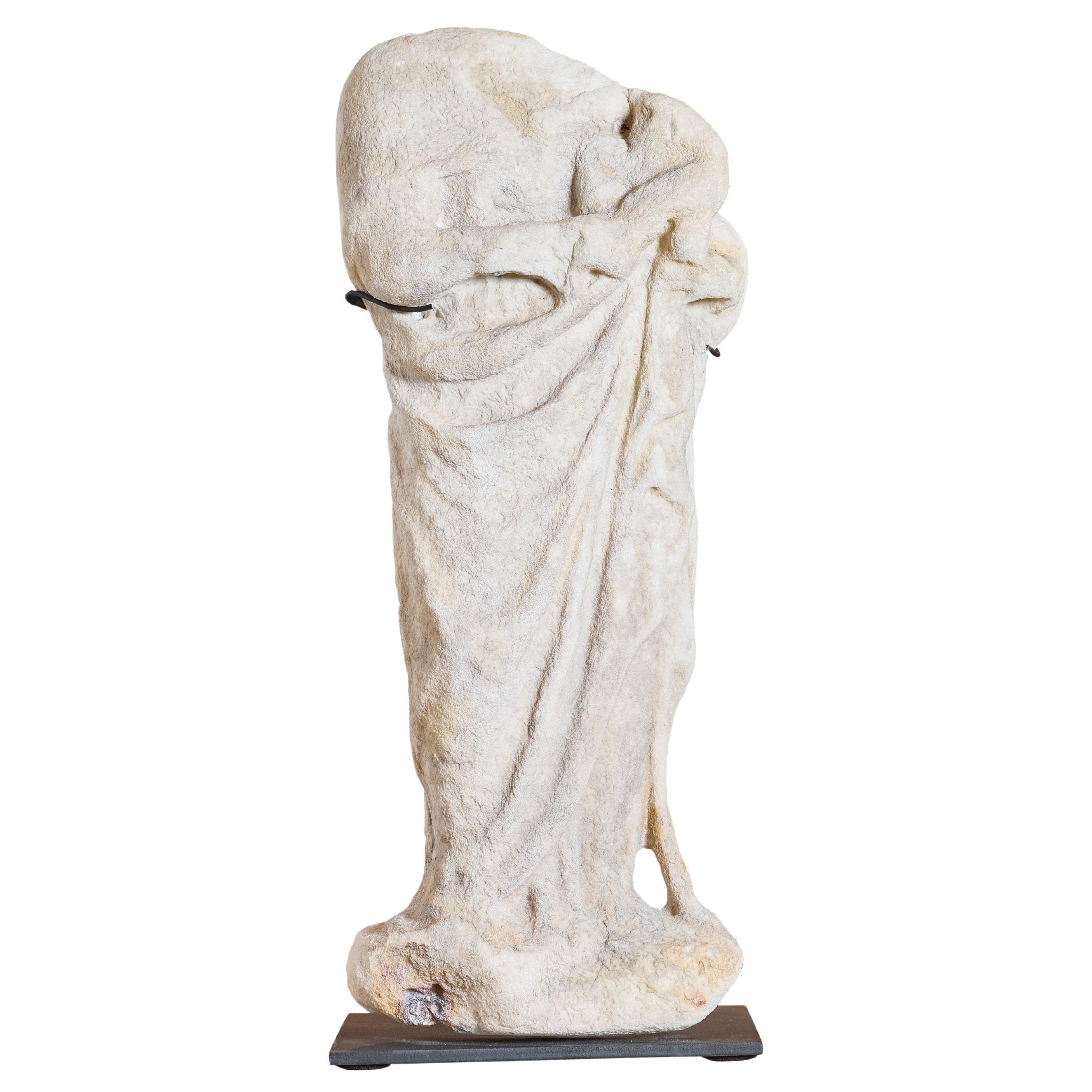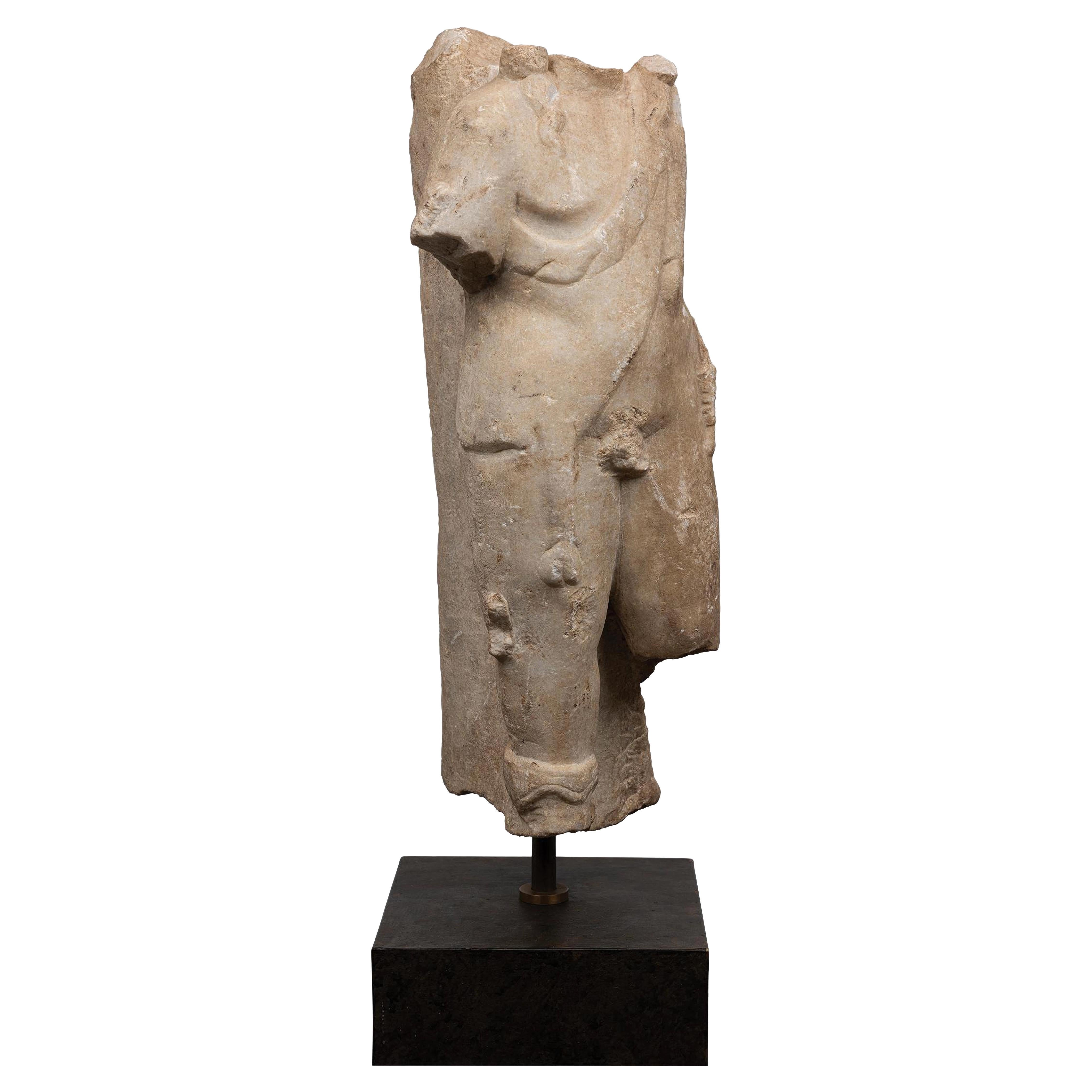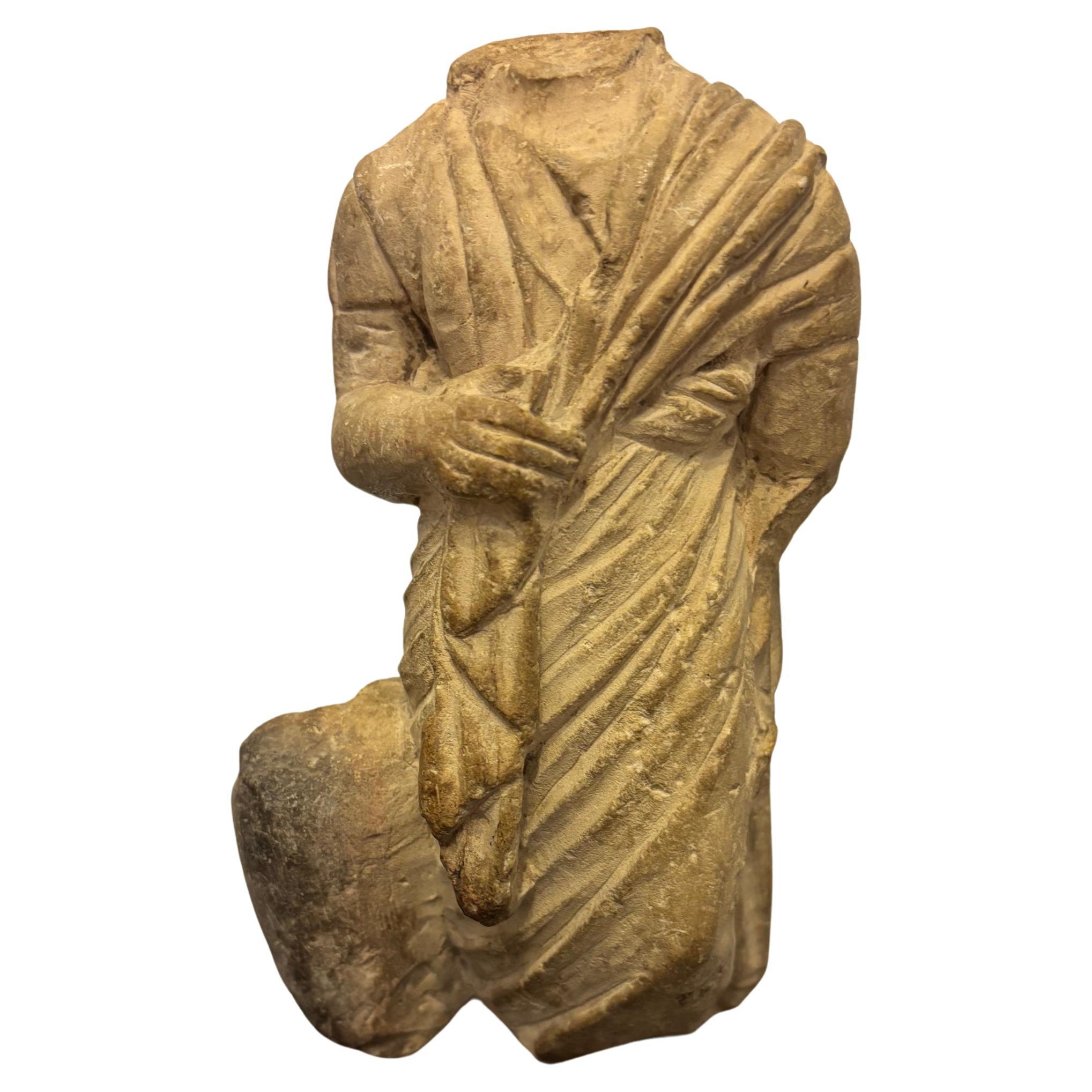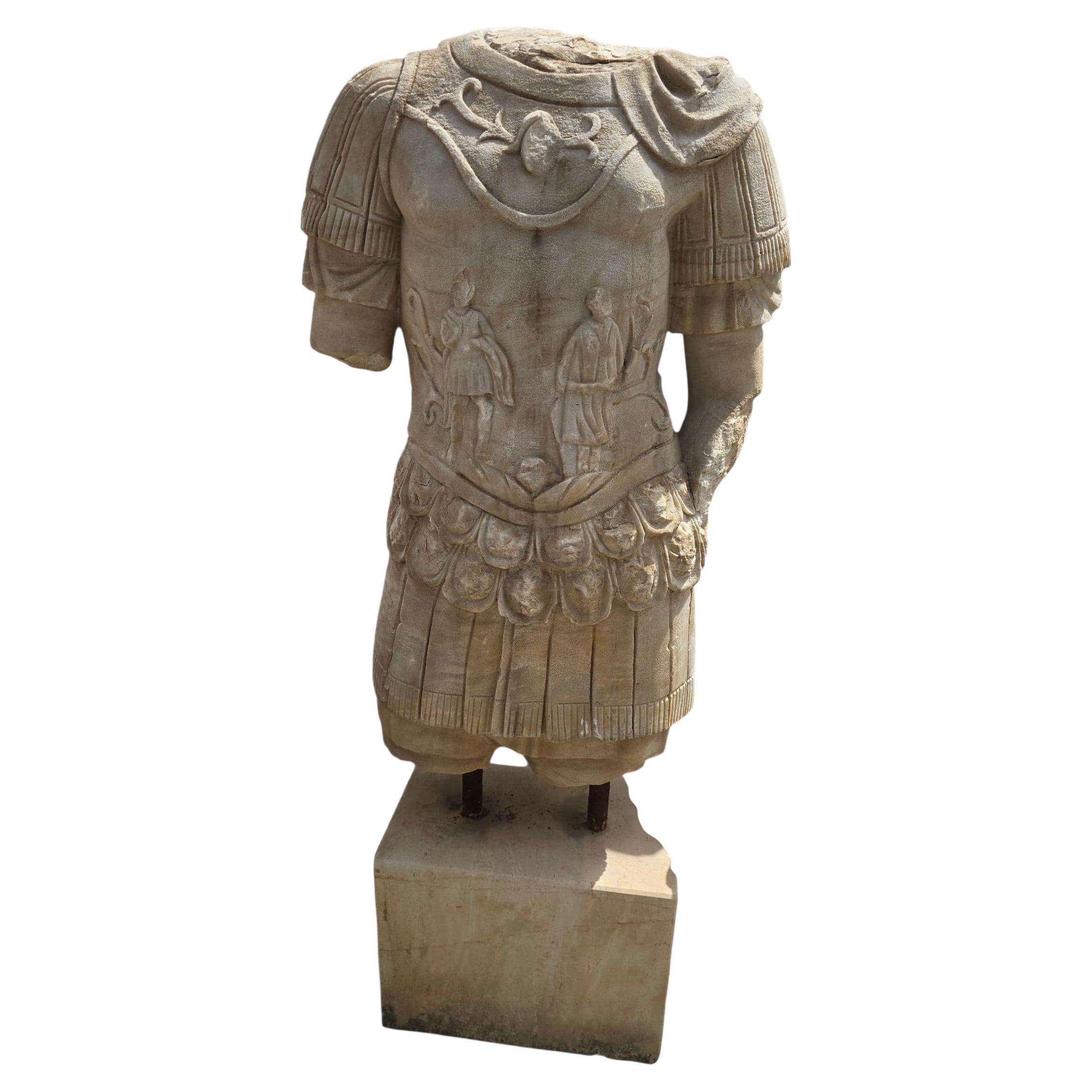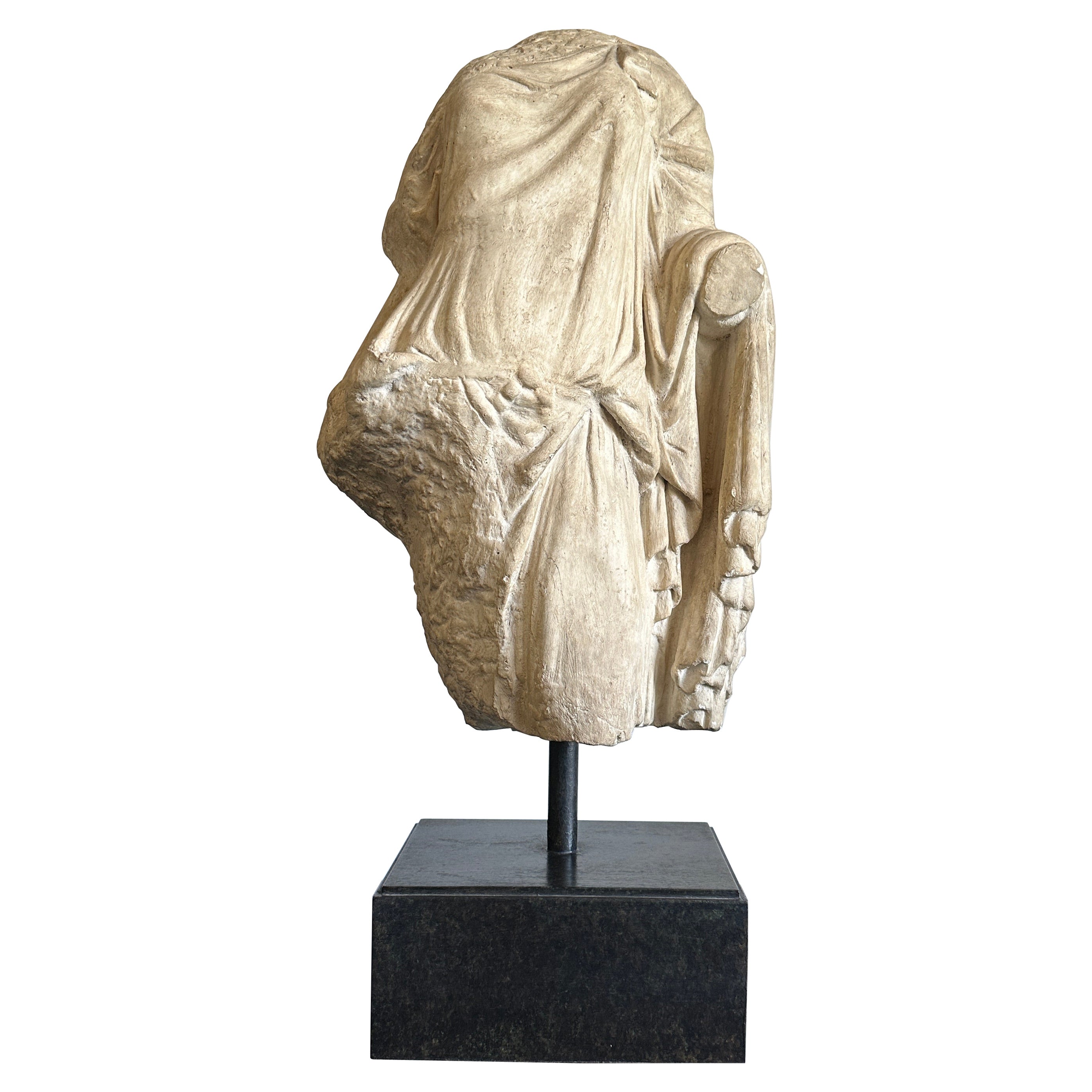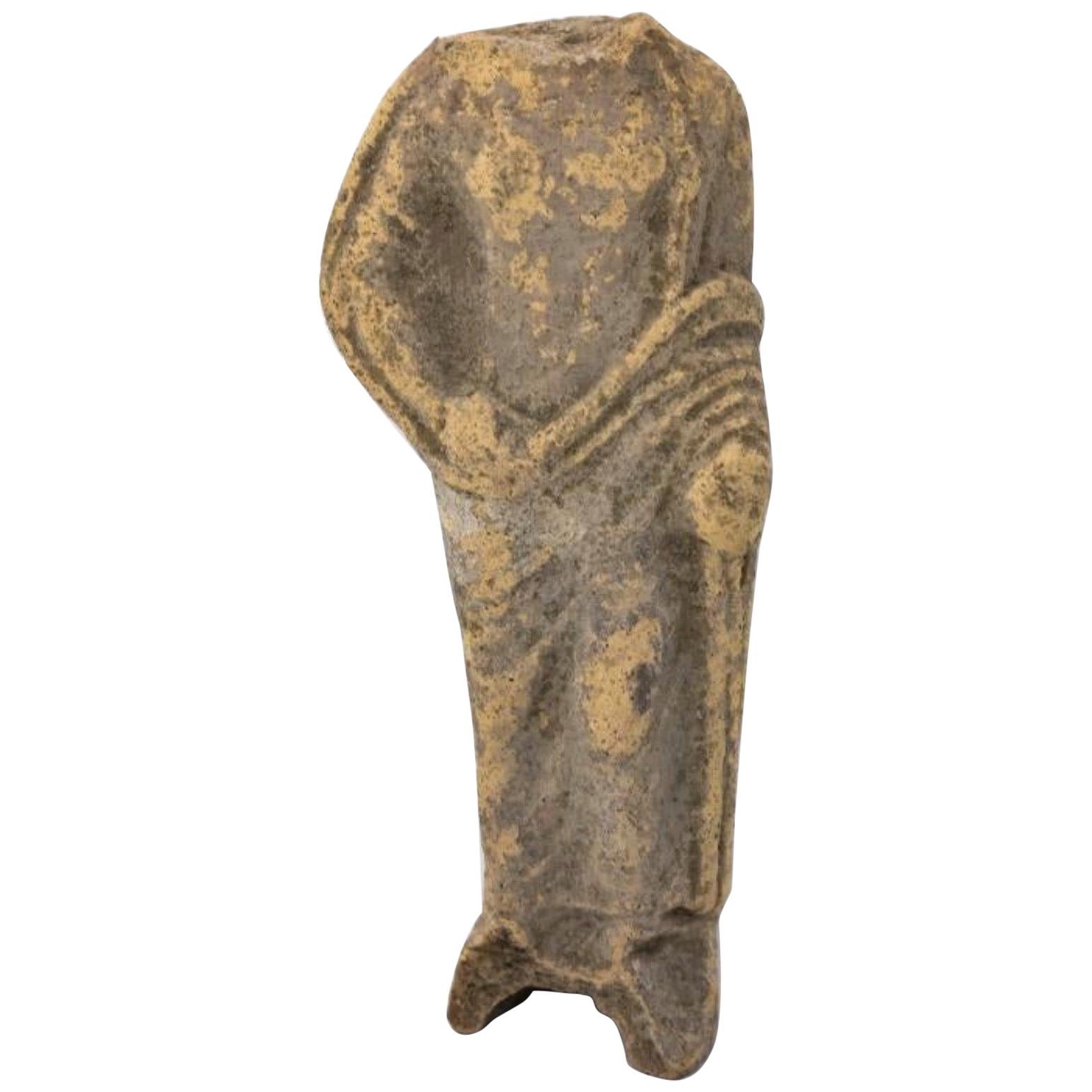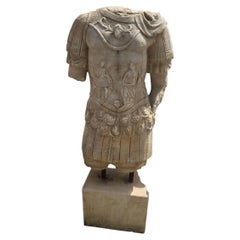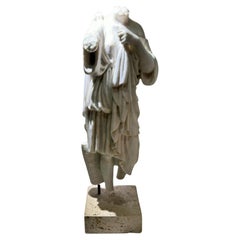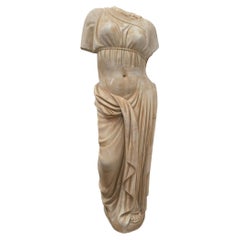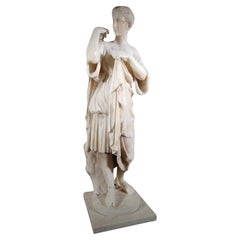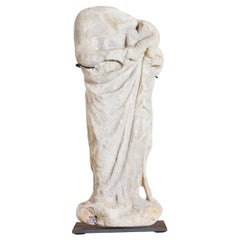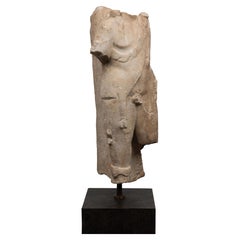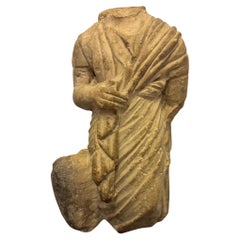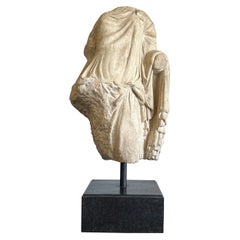Items Similar to Roman Marble Trapezophorus circa 1st-2nd Century A.D
Want more images or videos?
Request additional images or videos from the seller
1 of 18
Roman Marble Trapezophorus circa 1st-2nd Century A.D
$40,341.28
$50,426.6020% Off
£29,985.11
£37,481.3820% Off
€33,960
€42,45020% Off
CA$55,995.91
CA$69,994.8920% Off
A$62,816.82
A$78,521.0220% Off
CHF 32,478.16
CHF 40,597.7020% Off
MX$757,605.45
MX$947,006.8220% Off
NOK 413,190.22
NOK 516,487.7720% Off
SEK 386,991.87
SEK 483,739.8320% Off
DKK 258,525.31
DKK 323,156.6320% Off
About the Item
A Roman marble trapezophorus in the Form of a Barbarian Dacian young figure.
Circa 1st-2nd century A.D.
Measure: height 24 1/4 inches (62 cm).
Property from Mr. Radu Moldovan, Skokie, Illinois
Provenance:
B.C. Holland Gallery, Chicago, Illinois.
Jonathan Piser, Chicago, Illinois and Mexico, acquired from the above in the 1970s.
Standing with his left leg crossed over the right, and his hands bound before him, and wearing boots, leggings, short tunic bound with a belt, and mantle falling over the back, no restorations.
It is worth noting the high social position of this young man, since he has a gathered tunic with 2 brooches on each side of the shoulder. The position that the figure acquires is "a dignified position" in comparison with other captives in a submissive position.
He has the same position as:Barbarian prisoner Thusnelda, Loggia dei Lanzi, Florence
Early 2nd cent. AD
Discovered in Rome, in 1541 already part of the Capranica della Valle collection in Rome. From 1584 at the Villa Medici in Rome, in Florence since 1787. In the Loggia since 1789.
The inspiration for this sculpture likely comes from the series of bound Dacian captives that decorated Trajan's Forum. The campaign took nearly 50,000 Dacians as slaves and was commemorated on a triumphal column. There the Dacians are depicted in submission and serve as a symbol of Rome's expansion and imperial power.
The last king of Dacia, Decebalus, was a long-standing foe of Rome. In 101 A.D., Emperor Trajan led a major campaign in person to conquer the region. Trajan's engineers constructed an impressive timber bridge over the Danube and the Emperor led his troops into Dacia quickly defeating Decebalus' army. The two sides signed a peace treaty, but Decebalus couldn't resist continuing to raid Roman territory. Soon war broke out again. The Dacians fought vigorously, but Trajan brought overwhelming force to bare employing no fewer than 13 legions. The Romans ground forward inexorable into Dacia eventually capturing the capital city. Decebalus fled with the Roman cavalry in hot pursuit. Finally, with Roman troopers closing in and his bodyguards slain, Decebalus took his own life.
With the death of Decebalus in 106 A.D., the Dacian Wars ended, and the Kingdom of Dacia was annexed and turned into a Roman province. These foreign conflicts resulted in changes to the physical landscape of Rome itself. Dacia was a region with abundant mineral resources and when Rome annexed it, they also took control of especially rich gold and silver mines. Ancient historians claim Trajan acquired nearly 550 tons of gold and silver from Decebalus' treasury. Much of this staggering wealth was expended on spectacular building projects in Rome, the centerpiece of which was Trajan's Forum.
Catalogue note
For a related figure in the Museum of Fine Arts Boston see: Christie's, London, October 24th, 2013, no. 74.
- Dimensions:Height: 24.41 in (62 cm)Diameter: 9.06 in (23 cm)
- Style:Classical Roman (Of the Period)
- Materials and Techniques:
- Place of Origin:
- Period:
- Date of Manufacture:1st-2nd Century A.D.
- Condition:Wear consistent with age and use.
- Seller Location:Madrid, ES
- Reference Number:1stDibs: LU5779231828162
About the Seller
4.8
Platinum Seller
Premium sellers with a 4.7+ rating and 24-hour response times
Established in 2005
1stDibs seller since 2021
367 sales on 1stDibs
Typical response time: 1 hour
- ShippingRetrieving quote...Shipping from: Madrid, Spain
- Return Policy
Authenticity Guarantee
In the unlikely event there’s an issue with an item’s authenticity, contact us within 1 year for a full refund. DetailsMoney-Back Guarantee
If your item is not as described, is damaged in transit, or does not arrive, contact us within 7 days for a full refund. Details24-Hour Cancellation
You have a 24-hour grace period in which to reconsider your purchase, with no questions asked.Vetted Professional Sellers
Our world-class sellers must adhere to strict standards for service and quality, maintaining the integrity of our listings.Price-Match Guarantee
If you find that a seller listed the same item for a lower price elsewhere, we’ll match it.Trusted Global Delivery
Our best-in-class carrier network provides specialized shipping options worldwide, including custom delivery.More From This Seller
View AllAntique Hand-Carved Marble Sculpture of a Roman Emperor, Early 20th Century
Located in Madrid, ES
Impressive and finely detailed marble sculpture of a Roman emperor, hand-carved in Italy in the early 20th century. The figure is portrayed in full imperial armor, including a richly...
Category
Vintage 1930s Figurative Sculptures
Materials
Marble
$9,996 Sale Price
20% Off
Italian Sculpture "Venus Gabi" Headless Torso Early 20th Century Carrara Marble
Located in Madrid, ES
Italian sculpture "Venus Gabi".
Headless Torso.
Early 20th century.
Carrara marble.
Measures: H 74cm.
Perfect Condition.
Category
Early 20th Century Italian Baroque Figurative Sculptures
Materials
Carrara Marble
$7,127 Sale Price
20% Off
Large Italian Marble Sculpture of a Roman Woman, Early 20th Century
Located in Madrid, ES
Large Italian Marble Sculpture of a Roman Woman, Early 20th Century
Description:
Elegant marble sculpture of a classical Roman woman, c...
Category
Vintage 1920s Statues
Materials
Marble
$23,558 Sale Price
20% Off
Diana de Gabios marble sculpture 19th century
Located in Madrid, ES
It is the sculpture of a woman covered with a draped chiton, probably representing the goddess Artemis and traditionally attributed to the sculptor Praxiteles. Found in the ancient t...
Category
Antique Late 19th Century Figurative Sculptures
Materials
Marble
$2,698 Sale Price
20% Off
French Gothic Stone Sculpture – 14th Century
Located in Madrid, ES
Possibly a Noblewoman
Elegant stone sculpture from 14th-century Gothic France, possibly representing a noble lady. The bust features finely carved details in the attire, with attent...
Category
Antique 15th Century and Earlier Figurative Sculptures
Materials
Limestone
$3,858 Sale Price
20% Off
Large Classical Greek-Style Plaster Bust, 1950s
Located in Madrid, ES
Impressive plaster bust in the style of Classical Greece, crafted in the 1950s. This sculptural piece features refined facial features, flowing hair, and idealized proportions remini...
Category
Vintage 1940s Figurative Sculptures
Materials
Plaster
$2,317 Sale Price
20% Off
You May Also Like
Ancient Roman Marble Sculpture
Located in Round Top, TX
Ancient Roman marble sculpture. Includes custom iron stand. This is the real thing!
Category
Antique 15th Century and Earlier Italian Figurative Sculptures
Materials
Marble, Iron
A Roman Marble Sculpture of Hercules, Circa 1st / 2nd Century AD Ex Sotheby's
Located in ARMADALE, VIC
A Roman Marble Sculpture of Hercules, Circa 1st / 2nd Century AD
The sculpture is nude except for the draped Nemean lion skin.
Provenance: Sotheby's London, December 14, 1981, lot ...
Category
Antique 15th Century and Earlier Italian Classical Roman Figurative Scul...
Materials
Marble
TOGATUS STATUETTE, A Roman marble togatus. 2nd-3rd century AD.
Located in Nice, Cote d' Azur
TOGATUS STATUETTE
Depicting a male figure dressed in a toga and himation, held by his right hand.
Presence of a prop on the right thigh, implying that this fragment was part of a sta...
Category
Antique 15th Century and Earlier Italian Classical Roman Busts
Materials
Marble
Roman Plaster Torso of a Goddess on Stand - Replica
Located in New York, NY
Plaster sculpture on metal stand of an elegant goddess draped torso. Magnificent piece with unique detail of drapery folding on her femenine figure.
Property from esteemed interior...
Category
Antique 19th Century Greek Greco Roman Figurative Sculptures
Materials
Metal
Antique Roman / Etruscan Style Statue
Located in Sheffield, MA
Antique Roman / Etruscan style pottery partial statue. Robed figure in draped fabric. Measures: 7.5 inches in height. Exact age unknown, the pieces in t...
Category
Antique Early 19th Century Italian Classical Roman Statues
Materials
Terracotta
Statue sculpture life size antique old Roman Greek stone reclaimed carving decor
Located in Costa Mesa, CA
Antique statue life sized Roman Greek natural stone old sculpture.
The antique life sized statue displayed in this Ad is one of 12 reclaimed life sized ...
Category
Antique 18th Century French Rustic Figurative Sculptures
Materials
Limestone
More Ways To Browse
Roman Cross
Ancient Roman Column
Roman Marble Column
Medici Marble
Roman Capital
Marble 15th Century
Antique Forum
Mexican Antique Sculpture
Jonathan Leder
Antique Figural Silver Centerpiece
Loggia Furniture
Arts And Crafts Silver Brooch
Peace Brooch
Mexican Silver Belt
Column Trajan
Cavalry Boots
Capodimonte Italy Porcelain
Carved Fertility
